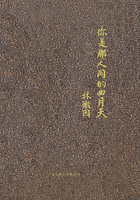This was early in the year 1782. The Legislature met at Jacksonborough, a little village on the Edisto or Pon-Pon river, on the 18th January of this year. This position, almost within striking distance of the British army at Charleston, was chosen with particular reference to the moral influence which the boldness of such a choice would be likely to have upon the people, and the confidence which it seemed to declare in the ability of the American army to render the place secure. To make it so, Greene moved his troops across the Edisto, and took post at Skirving's plantation, six miles in advance of Jacksonborough, and on the road which leads to Charleston. There was yet another step necessary to this object.
The British, in addition to Charleston and the "Neck", held possession of two islands, James and John, which belong to that inner chain of isles which stretches along the coast from Charleston to Savannah, separated from the main by creeks and marshes, and from one another by the estuaries of rivers, sounds, or inlets. On John's Island, which is fertile, extensive, and secure, the enemy held a very respectable force under Col. Craig. Jacksonborough was within striking distance of this force. It could be approached by boats or galleys, in a single tide. It was equally assailable from this point by land.
As a matter of precaution, it was considered necessary to disperse this force, and it was soon ascertained, not only that the island was accessible, but that the enemy, relying upon the protection of his armed galleys, was unapprehensive of attack. The attempt was entrusted to Cols. Lee and Laurens, who, with separate parties, were to reach the point of destination by different routes.
One of the parties lost the road, and failed to cooperate with the other.
The movement was only partially successful. A second was designed, and succeeded. The galleys were driven from their station by the artillery, and Laurens penetrated to Craig's encampment. But the latter had already abandoned it. A few stragglers fell into the hands of the Americans, but nothing more. The preceding attempt had just sufficed to convince Craig of the insecurity of the place, and he had taken timely precautions against suffering from a repetition of the attempt.
The Legislature assembled according to appointment. The proclamation of the Governor, to whom, from the beginning of the war, had been accorded almost dictatorial powers, precluded from election and suffrage all persons who had taken British protections; and, as those who were true to the State had been very generally active in the ranks of her military, it followed, as a matter of course, that a great proportion of the members were military men. Among these were Sumter and Marion. The former, about this time, yielded his commission to the authorities, on account of some slight or injustice to which he had been subjected, and left the army when he took his seat in the Assembly.
General Henderson succeeded to his command. The Jacksonborough Assembly was highly distinguished, as well for its talent as for its worth and patriotism. Its character was, perhaps, rather military than civil. Constituting as they did, in a slave community, a sort of feudal aristocracy, and accustomed, as, for so long a time they had been, to the use of the weapons of war, its members wore the deportment of so many armed barons, gathered together quite as much for action as resolve. It was not only unavoidable, but highly important at this juncture, that such should be the character of this body.
Who could so well determine what were the necessities of the country --what the exigencies of the people -- what the local resources and remedies --as those who had fought its battles, traversed every acre of its soil, and represented its interests and maintained its rights when there was no civil authority? What legislators so likely to wield the popular will, as men who, like Marion and Sumter, had become its rallying leaders --whom the people had been accustomed to obey and follow, and by whom they had been protected. It was equally important that the legislation should come from such sources, when we consider the effect upon the enemy, still having a foothold in the State. They might reasonably apprehend that the laws springing from such a body would be marked by a stern directness and decision of purpose which would leave nothing to be hoped by disaffection or hostility; and their proceedings did not disappoint the expectations of friend or foe.
The measures of this Assembly were marked by equal prudence and resolve.
They passed a new act respecting the militia, and one for raising the State quota of Continental troops. One of their measures has been questioned as unwise and impolitic -- that, namely, for amercing and confiscating the estates of certain of the loyalists, and for banishing the most obnoxious among them. Something, certainly, is to be said in favor of this act. If vindictive, it seems to have been necessary. It must be remembered that, in consequence of a previous proclamation of the Governor, none but the most implacable and virulent of the Tories were liable to its operation -- none but those who had rejected very liberal offers of indulgence and conciliation. This proclamation had opened the door to reconciliation with the State, on very easy terms to the offenders. It gave them timely warning to come in, enrol themselves in the American ranks, and thus assure themselves of that protection and safety which they had well forfeited.
Their neglect or refusal to accept this proffer of mercy, properly incurred the penalties of contumacy. These penalties could be no other than confiscation of property and banishment of person. Reasons of policy, if not of absolute necessity, seemed to enforce these penalties.















